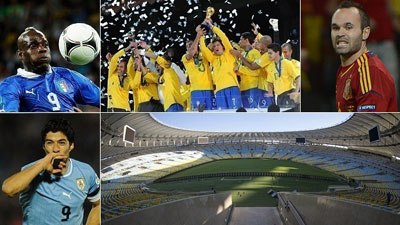With the 2014 World Cup less than a year away, all eyes will be on Brazil over the next fortnight as they stage a dress rehearsal for next year’s main event.
Among the eight participating nations in this year’s Confederations Cup, which starts on Saturday, are some of the world’s best footballers as they compete over 16 matches and six different venues to give a glimpse of what is in store in Brazil 2014.
From world champions Spain, to goal-line technology, to the romance of Tahiti’s involvement, the tournament will be sure to attract the attention of football fans across the world.
Group A:
Brazil v Japan (15 June, Brasilia, 20:00)
Mexico v Italy (16 June, Rio de Janeiro, 20:00)
Brazil v Mexico (19 June, Fortaleza, 20:00)
Italy v Japan (19 June, Recife, 23:00)
Japan v Mexico ( 22 June, Salvador, 20:00)
Italy v Brazil (22 June, Belo Horizonte, 20:00)
Group B:
Spain v Uruguay (16 June, Recife, 23:00)
Tahiti v Nigeria (17 June, Belo Horizonte, 20:00)
Spain v Tahiti (20 June, Rio de Janeiro, 20:00)
Nigeria v Uruguay (20 June, Salvador, 23:00)
Nigeria v Spain (23 June, Fortaleza, 20:00)
Uruguay v Tahiti (23 June, Recife, 20:00)
Semi-finals:
Winner Group A v runner-up Group B (26 June, Belo Horizonte, 20:00(
Winner Group B v runner-up Group A (27 June, Fortaleza, 20:00)
Third place play-off
30 June, Salvador, 17:00
Final:
30 June, Rio de Janeiro, 23:00
The Confederations Cup has brought together the world and continental champions since the 1990s, but its origins can be traced back to a tournament that was once very different.
Now, the competition takes place every four years and features the reigning champions of the six confederations that make up Fifa, with Spain travelling as representatives of European governing body Uefa.
The final two places are taken by the World Cup holders, plus the next hosts, although with Spain the reigning world and European champions, Euro 2012 runners-up Italy have been invited as the eighth team.
In 1980, Uruguay hosted the Copa D’Oro, also known as the Little World Cup, to celebrate the 50th anniversary of the World Cup, which had also been held in Uruguay. The six winners of the World Cup were all invited, with only England declining the invitation. Their place was taken by the Netherlands, World Cup runners-up in 1974 and 1978.

